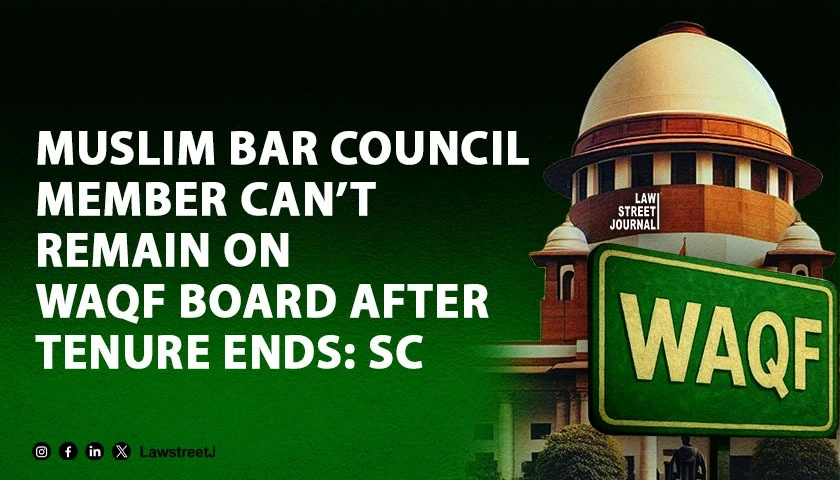NEW DELHI: The Supreme Court has ruled that a Muslim member of the Bar Council of the State or the Union territory, duly elected as a member of the Waqf Board constituted under Section 14 of the Wakf Act, 1995, cannot continue to hold the said position after the expiry of his tenure.
A bench of Justices M M Sundresh and Rajesh Bindal declared that the term of a member of the Bar Council serving on the Board, is co-terminus with their membership in the Bar Council itself.
The court said, in the event that there are no Muslim members available in any of the categories listed in Section 14(1)(b) of the 1995 Waqf Act, an ex-Member of Parliament, State Legislative Assembly or an ex-Member of the Bar Council, as the case may be, would constitute the electoral college.
"An ex-member of the Bar Council would constitute the electoral college only when there is no eligible member as provided for in Section 14(1)(b)(iii) of the 1995 Act, and the proviso contained therein. This means that if there is no serving Muslim member in the Bar Council and also no Senior Muslim advocate who is available, only then would an ex-Member of the Bar Council be eligible to be a member of the Board," the bench said.
Allowing an appeal filed by Md Firoz Ahmad Khalid, the court set aside the Manipur High Court's division bench judgment of November 23, 2023. It noted there is no dispute with respect to the appellant’s eligibility to be a Member of the Board by virtue of his membership in the Bar Council.
The High Court, however, placing reliance on Explanation II to Section 14(1)(b) of the 1995 Act, has arrived at the conclusion that the said Explanation only speaks about instances wherein a Member of the Board, who ceases to be a Member of Parliament or Member of the State Legislative Assembly, as the case may be, would be deemed to have vacated their position in the Board.
The High Court further held that the said Explanation does not apply to a Member of the Board, who ceases to hold their position as a Muslim Member of the concerned Bar Council.
The court opined giving an overreaching interpretation to Explanation II to Section 14(1)(b) of the 1995 Act, to imply that a Muslim member of the Bar Council would continue to hold membership in the Board, despite losing their position in the former post, would amount to treating Members of Parliament and Members of the State Legislative Assembly differently from Members of the Bar Council.
It pointed out, no intelligible differentia is discernible for such a classification from the scheme of the provision.
In fact, it is tantamount to rewriting the provision in its entirety, the court held.
The court found it axiomatic to state that an existing Muslim member of the Board from the Bar Council, would cease to be a member of the Board, upon the completion of their tenure as a member of the Bar Council, when there is another Muslim member available to replace them from within the Bar Council.
Upon a reading of the entire provision, the court said, it is clear that there is no conscious intention on the part of the Legislature to omit the applicability of Explanation II to Section 14(1)(b) of the 1995 Act, to Muslim Members of the Board elected from the Bar Council.
The court also explained that the object of any provision must be seen in light of the provisions surrounding it, which includes the proviso and the explanation appended to it.
"When a right accrues to a person pursuant to a position that they hold, it ultimately becomes a qualification. Once such qualification ceases to exist, that person would not be eligible to hold any other post based on his earlier position, unless the statute categorically facilitates the same," the bench said.
The court stressed an explanation, which is simply in the nature of a clarification as regards certain categories, cannot be read in a manner which is violative of the substantive part of the provision.
"Although normally, a proviso cannot be used to understand the substantive part of the provision, there is no absolute bar in doing so, particularly in cases where the statute is peculiar and the proviso does not create any exception," it said.
The court emphasised Explanation II to Section 14(1)(b) of the 1995 Act must be given a harmonious construction and purposive interpretation to mean that the term of a member of the Bar Council serving on the Board, is co-terminus with their membership in the Bar Council itself.
The court also declared that the decision rendered by the Bombay High Court's Nagpur Bench, Nagpur in 'Shri Asif S/o Shaukat Qureshi Versus the State of Maharashtra and Anr' decided on December 22, 2016, was not a good law.















